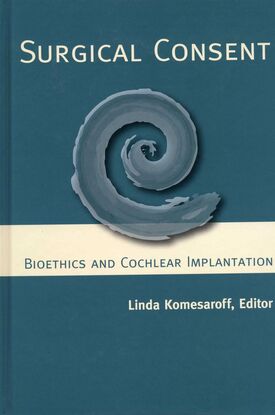
Surgical Consent
Bioethics and Cochlear Implantation
Description
With the rate of cochlear implantation reaching 80% to 90% of all deaf children, some as young as five months old, Surgical Consent: Bioethics and Cochlear Implantation arrives at a critical juncture. This comprehensive collection features essays by Priscilla Alderson, Inger Lise Skog Hansen, Hilde Haualand, volume editor Linda Komesaroff, Paddy Ladd, Harlan Lane, Karen Lloyd, Eithne Mills, Paal Richard Peterson, Gunilla Preisler, Kristina Svartholm, and Michael Uniacke. These worldwide renowned ethicists, educators, and Deaf leaders express their diverse perspectives on the bioethics of childhood cochlear implantation according to their discipline and a number of themes of inquiry: human rights, medical and social ethics, psychology, education, globalization, identity, life pathways, democracy, media, law, and biotechnology.
Drawing on current research, this volume presents the varying reactions around the globe to the high rate of implantation. These views contrast sharply with the medical perspective of deafness overwhelmingly promoted through the media and by the cochlear implantation industry. At the same time, the contributors aim to disrupt the binaries that have long dominated the field of deafness — speech versus sign, instruction through speech and sign systems versus bilingual education, and medical intervention versus cultural membership in the Deaf community.
Surgical Consent begins and ends with the voices of Deaf people. Their articulate and, at times, raw insights clearly delineate the issues of power, positioning, and minority-majority group relations that are inherent in the dominant hearing culture’s understanding of diversity and globalization.
Linda Komesaroff is a senior lecturer at Deakin University in Australia.